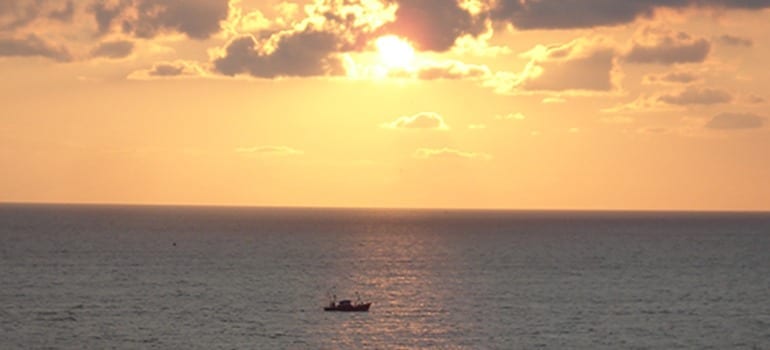
Closing the high seas to fishing could increase fish catches in coastal waters by 10 per cent, helping people, especially the most vulnerable, cope with the expected losses of fish due to climate change, new UBC research finds.
“Many important fish stocks live in both the high seas and coastal waters. Effective management of high seas fisheries could benefit coastal waters in terms of productivity and help reduce climate change impacts,” said lead author William Cheung, associate professor and director of science of the Nippon Foundation-Nereus Program at UBC’s Institute for the Oceans and Fisheries.
The high seas are areas of ocean outside the jurisdiction of any country and cover nearly two-thirds of the ocean’s surface.
Researchers used computer models to predict catches of 30 important fish stocks that live in both the high seas and coastal waters in 2050 under three different management scenarios: closing the high seas to fishing, international cooperation to manage fishing, and maintaining the status quo.
They found that both strengthening governance and closing the high seas to fishing increased the resilience of coastal countries to climate change, especially in tropical countries where there is a high dependence on fisheries for food and livelihood.
“The scenarios of closing the high seas may greatly reduce the issue of inequity of benefits and impacts among different countries under climate change,” said co-author Vicky Lam, a postdoctoral fellow at UBC’s Institute for the Oceans and Fisheries.
Climate change is expected to disproportionately impact countries in the South Pacific, Indo-Pacific, West African coast and west coast of central America. Previous UBC research shows that if carbon dioxide levels continue to rise on the current trajectory and the Earth warms, these countries could face a 30 per cent decrease in fish stocks as fish migrate to cooler waters.
“The high seas can serve as a fish bank of the world by providing the insurance needed to make the whole global ocean more resilient,” said paper co-author Rashid Sumaila, professor at UBC’s Institute for the Oceans and Fisheries and director of OceanCanada, one of the research funders. “By closing the high seas to fishing or seriously improving its management, the high seas can help us mitigate and adapt to the effects of climate change on marine ecosystems.”
Learn more: High seas fisheries management could recoup losses due to climate change
The Latest on: High seas fisheries management
[google_news title=”” keyword=”High seas fisheries management” num_posts=”10″ blurb_length=”0″ show_thumb=”left”]
via Google News
The Latest on: High seas fisheries management
- U.S. Plan to Protect Oceans Has a Problem, Some Say: Too Much Fishingon April 30, 2024 at 10:30 am
An effort to protect 30 percent of land and waters would count some commercial fishing zones as conserved areas.
- Interview: How Europe’s swift action saved commercial hake stockson April 30, 2024 at 7:19 am
Persistent overfishing in European seas led to the decline of many fish species in the 1990s. However, efforts to restore hake populations to sustainable levels in recent decades have proven ...
- 12 years of ‘legalized theft’ of our seaon April 29, 2024 at 1:39 pm
A little more than a decade ago, the Fishing Law was based on acts of corruption. Investigations by the Public Prosecutor's Office uncovered the financing ...
- ICAR-CIFT celebrates 67th Foundation Day in Visakhapatnamon April 29, 2024 at 7:01 am
Celebrating the 67th Foundation Day of ICAR-CIFT in Visakhapatnam with emphasis on ocean conservation and sustainable fisheries management.
- How A.I. Is Revolutionizing Marine Conservationon April 25, 2024 at 5:00 am
Dyhia Belhabib’s journey to becoming a marine scientist began with war funerals on TV. Her hometown, on the pine-forested slopes of the Atlas Mountains in northern Algeria, lies only 60 miles from the ...
- Japan and others agree to cut northern Pacific saury catch quotaon April 18, 2024 at 9:52 pm
Japan and eight other economies agreed on a new rule Thursday that reduces the 2024 catch quota for saury in the high seas in the northern Pacific to 135,000 metric tons from 150,000 metric tons.
- Advocates call on nations to adopt global transparency in fisherieson April 16, 2024 at 9:43 pm
Transparency and data sharing is one excellent way and a scalable and cost-effective way for countries to understand what is happening out on the high seas,' says Global Fishing Watch's Tony Long ...
- World leaders call on nations to swiftly ratify U.N. ocean treatyon April 16, 2024 at 12:07 pm
The European Union and the governments of 13 countries urged nations on Tuesday to prioritise the ratification of a U.N. treaty to protect the world's oceans from overfishing and other human ...
- World Leaders Are Not Doing Enough To Protect Our Ocean | Opinionon April 15, 2024 at 2:00 am
On the surface, the ocean looks beautiful to nearly everyone. But below, where it's difficult for humans to see, the myriad plants and wildlife that have thrived for millions of years are suffering.
via Bing News










